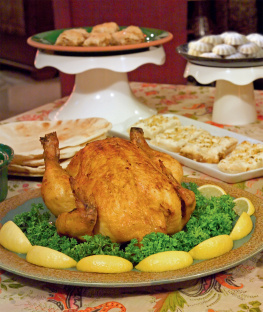A bic Zaynab
bic Zaynab and Sinbad the Sailor
T here once was a poor porter in Baghdad known as Sinbad the Porter. One very hot day while he was carrying a heavy load, he entered a neighborhood where the pavement was sprinkled with rosewater. The fresh scent and the cool breeze enticed him to lay down his load. He sat his weary body on a bench near a large mansion to relax.
While resting, he heard singing and the sounds of musical instruments coming from within the estate. Looking through the gate, he saw a garden filled with flowers and trays of luxurious foods being set on tables. He saw that a grand feast was about to be served.
Assuming that some great prince lived there, the porter asked one of the servants passing by his bench to whom the house belonged. He was told it was Sinbad the Sailors. He couldnt believe that two people with the same name could be so different. While Sinbad the Sailor lived in luxury like a king, Sinbad the Porter lived poor and miserably.
Feeling even more dejected, he got up, picked up his load, and whimpered about how life was unfair. At that moment, a servant approached and informed him that Sinbad the Sailor wanted to speak to him.
The porter was embarrassed. He tried to say no, but on the insistence of the servant, he accepted the invitation.
He went through the spacious gardens, into the dazzling mansion, and then he entered a grand sitting room to join the other guests. Lords and nobles sat at magnificent dining tables being entertained by beautiful maidens singing songs of love and pleasure. It was a sight that was fit for only a king and his royal entourage. Sinbad the Porter was in awe and at a loss for words.
The host, Sinbad the Sailor, asked the porter to repeat what he had complained about at the gate of his mansion. At first, the porter was embarrassed, but finally he was convinced that no harm would come if he repeated what he had said.
Sinbad the Sailor listened. He was moved by the porters anguish, and in response told him how he had gained his fortune through his adventures and travels.
Before the tale began, however, Sinbad the Porter, having had his fill of an elegant meal, was served the most succulent of sweets, a bic Zaynab, which made him feel as royal as any prince or king.
bic Zaynab, which made him feel as royal as any prince or king.
So the porter listened to Sinbad the Sailors tale, no longer filled with envy but relaxed and content. No matter how much fortune he had or did not have, as long as he could eat a bic Zaynab, he felt as rich as the other Sinbad. Really, food does make the man.
bic Zaynab, he felt as rich as the other Sinbad. Really, food does make the man.
 Christmas in our household was always celebrated with a
Christmas in our household was always celebrated with a bic Zaynab, translated as the fingers of Zaynab, which we simply called a
bic Zaynab, translated as the fingers of Zaynab, which we simply called a bic. When we were children, whenever we saw Moms wedding rings sitting on the counter and cornstarch all over the kitchen table, we knew that she was stretching out her homemade phyllo dough to make this, one of her many exquisite sweets.
bic. When we were children, whenever we saw Moms wedding rings sitting on the counter and cornstarch all over the kitchen table, we knew that she was stretching out her homemade phyllo dough to make this, one of her many exquisite sweets.
Although the source recipe calls for a specific dough for the fingers, we have opted for phyllo. In these fast-paced times, tradition continues but is now aided by ready-made ingredients that eliminate several time-consuming cooking tasks. Though Moms homemade phyllo dough took a full day to prepare, she never complained because she knew the end result would be greatly appreciated by family and friends. She was the one who devised the renovation of this traditional sweet by using phyllo dough instead of the crispy-hard shell of centuries ago.
Although phyllo dough makes it a delicate pastry, the a bic Zaynab filling is quite rich, a mixture of almonds and pistachios. This type of stuffing has been around for centuries. In fact, in one thirteenth-century culinary treatise, pistachios, either shelled, toasted, or ground, were commonly used in a number of savory and sweet dishes.
bic Zaynab filling is quite rich, a mixture of almonds and pistachios. This type of stuffing has been around for centuries. In fact, in one thirteenth-century culinary treatise, pistachios, either shelled, toasted, or ground, were commonly used in a number of savory and sweet dishes.
A bic Zaynab has not changed from the time it first appeared in history, centuries ago. These tubular, crispy, nut-filled sweet rolls look like what they are named for, the fingers of Zaynab, whoever she may have been. Because of their delicate formation, the appellation fingers serves well in this desserts name.
bic Zaynab has not changed from the time it first appeared in history, centuries ago. These tubular, crispy, nut-filled sweet rolls look like what they are named for, the fingers of Zaynab, whoever she may have been. Because of their delicate formation, the appellation fingers serves well in this desserts name.
Take pure white flour and knead with a thin syrup. Put a little yeast in it (or natron), an amount enough to make it rise. Take cane tubes, the thinnest you can find, in the length of your fingers. Grease them with sesame oil and coat them completely with the dough. Fry them lightly in sesame oil. Remove the pan from the heat. Remove the cane tubes and discard. Take shelled pistachios and almonds in equal portions and pound them and then mix pounded white sugar with them. Sprinkle musk-scented rosewater over them. Knead and stuff the tubes. Color them before frying, if desired. Fry until they are browned. Toss in syrup or honey. Remove and use.
SOURCE: Kanz al-Fawid
A bic Zaynab
bic Zaynab
About 35 pastries

INGREDIENTS
1 cup water
1 cup honey
2 tablespoons rosewater
1 cup coarsely ground pistachios
1 cup coarsely ground blanched almonds
1 cups sugar
teaspoon cinnamon
1 pound phyllo dough
1 cup melted butter
6 six-inch cannoli tubes
1 egg, beaten
Light sesame oil for deep-frying

 To make the syrup: In a small saucepan, mix together cup of the water and the 1 cup of honey. Bring to a boil over medium heat, stirring occasionally. Add 1 tablespoon of the rosewater, then reduce the heat to very low and simmer for 1 minute. Stir, then remove from heat and cover to keep the honey syrup warm.
To make the syrup: In a small saucepan, mix together cup of the water and the 1 cup of honey. Bring to a boil over medium heat, stirring occasionally. Add 1 tablespoon of the rosewater, then reduce the heat to very low and simmer for 1 minute. Stir, then remove from heat and cover to keep the honey syrup warm.
 To make the filling: Stir together in a mixing bowl the pistachios, the almonds, the sugar, the cinnamon, and the remaining tablespoon of rosewater. Set aside.
To make the filling: Stir together in a mixing bowl the pistachios, the almonds, the sugar, the cinnamon, and the remaining tablespoon of rosewater. Set aside.
 Cut the phyllo dough into 4-by-4-inch squares and cover with a slightly dampened towel to keep the sheets from drying out.
Cut the phyllo dough into 4-by-4-inch squares and cover with a slightly dampened towel to keep the sheets from drying out.
 Place two sheets on top of each other and brush the top sheet with the butter. Place a cannoli tube at an angle on the bottom corner of the phyllo square, then roll the dough over the tube. Seal to close by brushing with the egg, making sure the egg does not touch the tube.
Place two sheets on top of each other and brush the top sheet with the butter. Place a cannoli tube at an angle on the bottom corner of the phyllo square, then roll the dough over the tube. Seal to close by brushing with the egg, making sure the egg does not touch the tube.













 bic Zaynab
bic Zaynab bic Zaynab, which made him feel as royal as any prince or king.
bic Zaynab, which made him feel as royal as any prince or king. Christmas in our household was always celebrated with a
Christmas in our household was always celebrated with a bic Zaynab
bic Zaynab

 To make the syrup: In a small saucepan, mix together cup of the water and the 1 cup of honey. Bring to a boil over medium heat, stirring occasionally. Add 1 tablespoon of the rosewater, then reduce the heat to very low and simmer for 1 minute. Stir, then remove from heat and cover to keep the honey syrup warm.
To make the syrup: In a small saucepan, mix together cup of the water and the 1 cup of honey. Bring to a boil over medium heat, stirring occasionally. Add 1 tablespoon of the rosewater, then reduce the heat to very low and simmer for 1 minute. Stir, then remove from heat and cover to keep the honey syrup warm.